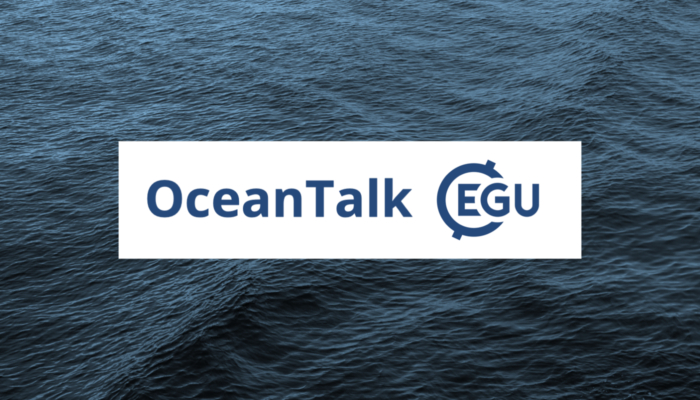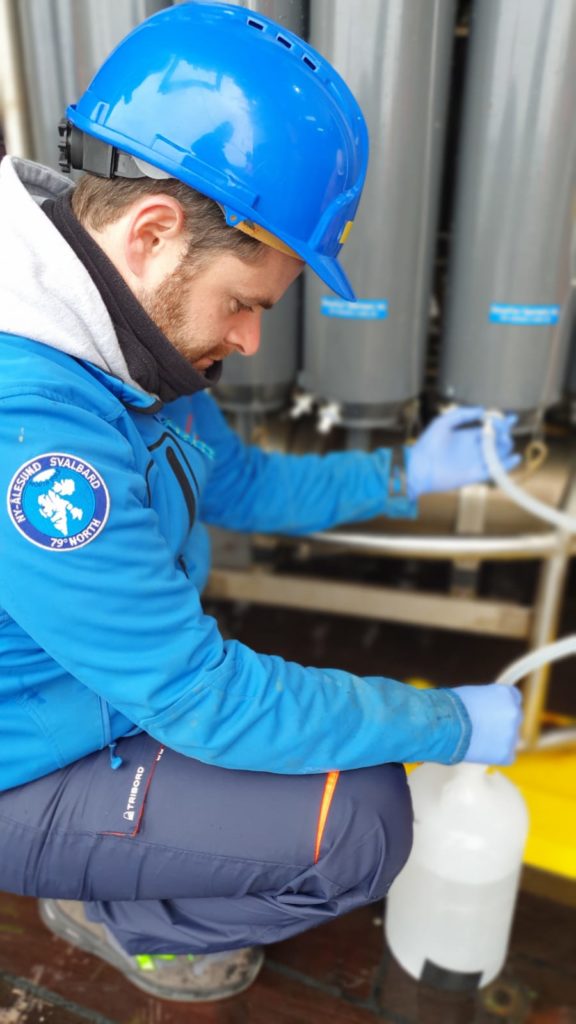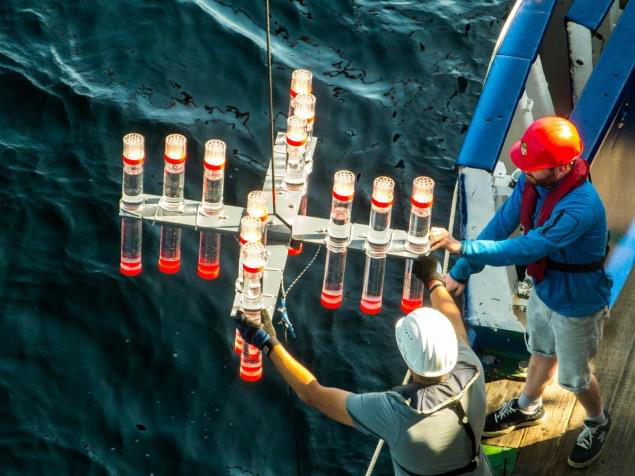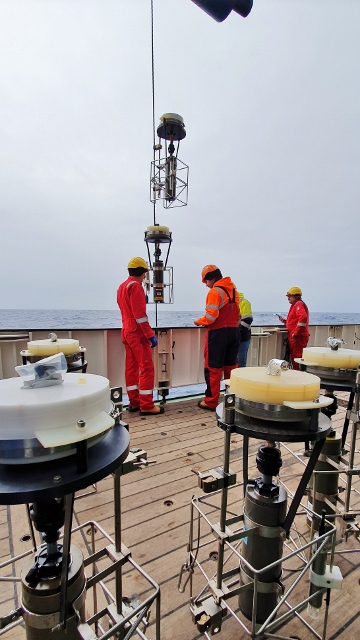
Frédéric Le Moigne has been awarded the 2020 Outstanding Early Career Scientist Award for the Division of Ocean Sciences and he agreed to be interviewed for our first blog post on the new Ocean Sciences blog.
Frédéric can you tell us about your background and education?
I was born and raised on the Atlantic coast, near the bay of Brest in Brittany, western France. In Brittany the ocean is an important part of life. I’ve always seen myself doing something related to the ocean. This is why I sought a degree in marine biology at the University of Western Brittany in Brest. I then crossed the Channel to the UK (only a few hundred kilometers away!) to do a PhD at the National Oceanography Centre, Southampton. This is where it all started, I really enjoyed my PhD, both from a personal and a professional perspective. My research was funded by the European community and as a result I travelled all over Europe. After a brief time in Germany at GEOMAR-Kiel, I returned to France to start a position as a tenured researcher. I am glad my scientific career has allowed me to discover various countries. Europe is a fantastic place for this, my generation is probably one of the first that considers Europe as a country thanks to the Schengen Agreement. I’m deeply attached to the idea that we can cross between the borders of European countries without showing ID.
Your research brings you to remote regions. What is the most challenging thing for you while working in remote places?
Working as an oceanographer brings you to amazing places all around the world that are not typical holiday destinations. Polar regions are a good example for instance. The downside of so much travel is that you are often far away from family, relatives and friends for long periods of time. We have all got used to this separation but it still hard at times. Last year’s Christmas and New Year’s Eve I spend on the RRS Discovery in the Southern Ocean, a time of the year that is normally dedicated to family and friends.

Frédéric Le Moigne taking samples from the CTD on board the RRS DISCOVERY December 2019. (Credit: Frédéric Le Moigne)
A part of your current research focuses on polar oceanography. Can you briefly explain how icebergs can influence marine primary production and how this might be affected by climate change?
In remote regions like the Southern Ocean the growth of small marine algae called phytoplankton is limited by the availability of specific nutrients needed in tiny amounts so called micronutrients. Icebergs act as gigantic delivery trucks full of micronutrients that could potentially fertilise the Southern Ocean. Further, global warming may increase the number of icebergs that are shed to the ocean. More icebergs could potentially increase phytoplankton activity in the Southern Ocean and thus increase carbon draw down from the atmosphere into the ocean referred to as carbon sequestration. However, a recent study (Hopwood et al., 2019, Nature Communications) showed that not all icebergs are created equal. Some tend to deliver most of their micronutrients in coastal waters, rather than in offshore waters as they drift and melt. This happens because in most icebergs, micronutrients are concentrated on the edges contrary to what was previously thought. Therefore, taking into consideration iceberg types is very important if one wants to assess the effect of future iceberg melting on marine productivity.
What challenges do you have to address when investigating the transport of organic matter from the surface water into the deep ocean in different oceanic regions?
Mainly logistical I would say. Doing any kind of fieldwork at sea on research vessels involves an incredible amount of planning before, during and after expeditions. Sea going expeditions always involve a lot of people, ranging from the ship’s engineers to the science support team. It’s like a small village going to sea where everyone has a role. Science would not be possible without these people. Investigating export fluxes has its own challenges. We have the habit of deploying drifting instruments in the ocean to catch flakes of “marine snow” made of ageing plankton falling from the surface ocean to the deep. Locating and recovering these drifting instruments is sometimes complicated.

Deploying a drifting mooring line onboard the RV METEOR offshore Peru in 2017. This mooring line is specifically designed to catch flakes of marine snow that fall from the surface ocean. (Credit: Jon Roa)
Your research spans across a wide range of topics of ecology, biogeochemistry and oceanography. How did you expand your knowledge and expertise so widely?
It starts with a solid university training in oceanography, all aspects of it. Understanding how ocean biology works requires a good knowledge of ocean physics and chemistry first. In addition, working in some of the largest ocean research institutes worldwide gives you the opportunity to hear about a very wide range of ocean research programs and to work with people from very different science backgrounds. My knowledge and expertise expand as a function of this. It helps to tackle science questions from different angles.
You will be recognized by the Ocean Sciences Division as an Outstanding Early Career Scientist in 2020. What personal and professional factors do you think led to this great recognition?
It’s easy to get somewhat discouraged by various aspects of this job. So, I think being persistent is crucial. Also, it’s important to always present your ideas to different people with different scientific backgrounds. This gives you a sense of how important and relevant your science questions are. This also helps to refine and improve your ideas. As Early Career scientists, we are often scrutinized. It’s important to listen to criticism and to make your scientific demonstration better, stronger and more understandable to all.

Deploying water pumps, called Stand Alone Pumps (or SAPS) onboard the RRS DISCOVERY in the Southern Ocean, 2020. The SAPS usually filter around 1500 L of seawater during just one hour of pumping. Thanks to these pumps, we get detailed information about the chemistry of marine snow. (Credit: Sophia Alexou)
What do you think are your major challenges as an early career scientist, and how are you tackling or preparing for them?
Giving yourself time to think about science is key. It’s easy to get involved in too many things. The scientific process takes time to mature and refine. Early careers scientists are somehow pushed towards publishing data too quickly without giving time to interpretation to fully develop. I recently secured a permanent CNRS researcher position (Centre National de la Recherche Scientifique) hosted at the Mediterranean Institute of Oceanography in Marseille, southern France. Such a position comes with a lot of administrative, organizational and representation tasks. But it also gives me a lot of freedom to think about what science should be done. This is crucial for conceiving and delivering high impact science.
Thank you, Frédéric, for the interview while you were at sea and for your advice to other Early Career Scientists!
Interviewed and edited by Meriel J. Bittner & Gwyn Evans
Reference:
Hopwood, M.J., Carroll, D., Höfer, J. et al. Highly variable iron content modulates iceberg-ocean fertilisation and potential carbon export. Nat Commun 10, 5261 (2019) doi:10.1038/s41467-019-13231-0
